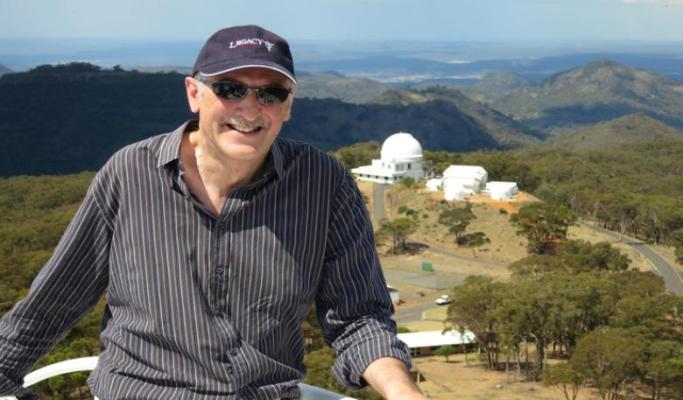When we celebrate World Space Week, we’re looking back to what most pundits consider as the dawn of the space age – 4 October 1957. On that day, the first artificial satellite took to the skies – the Soviet Union’s Sputnik, meaning ‘fellow traveller’. Of course, the world was stunned, since everyone expected the USA to be the first to launch a successful satellite.
For a youthful Fred Watson, however, Sputnik wasn’t much of a surprise. I was already a seasoned ‘fellow traveller’ with space, courtesy of a genius by the name of Frank Hampson. Frank was not a rocket scientist, but a gifted British artist – albeit a very unusual one. His imagined vistas of colourful alien environments were enhanced by healthy doses of real science, from orbital dynamics to interplanetary communications. My peers and I were totally captivated by the adventures of Frank’s space hero, Dan Dare, in the legendary 1950’s kid’s comic, Eagle.
Thus was kindled a passion that still burns brightly in your humble Astronomer-at-large. I was hooked, as we all were at that time. In fact, we were encouraged to be hooked, because there had recently been a world war fought with unprecedented scientific complexity – and everyone thought there would soon be another one. Science education reigned supreme.
As time went by, my colleagues took their schooling into practical realms like engineering, medicine and economics, but I remained steadfastly consumed by the world of space. Basically, I never grew up. University followed, and a career that has encompassed most aspects of astronomy.
But the fascination with the space environment has never left me, and I can’t tell you how delighted I am that Australia now has its own Space Agency. Much of what the Agency focuses on will be concerned with the downward-looking exploitation of space in communications and remote-sensing – commercial ventures that will significantly improve Australia’s one per cent share in the $400 billion global space industry. Agreements will shortly be signed with the European, UK and Canadian Space Agencies, hot on the heels of the Agency’s first industry agreement – with Airbus.
While the Australian Space Agency’s head, Dr Megan Clark, has recently described it as ‘the most industry-focused agency in the world’, it’s already clear that astronomy and planetary science will not be ignored. The sky’s the limit when it comes to exploring the Universe from space, with enormous potential once the detrimental effects of the Earth’s atmosphere are removed. I look forward to being involved, along with many of my astronomy colleagues.
The theme of this year’s Space Week is ‘Space unites the world’. What more inspiring cause could there be? Particularly for someone who grew up in a world divided in the aftermath of war…

